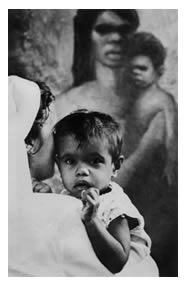Court orders Stolen compensation
 The NSW Supreme Court has approved a class action settlement for descendants of the Stolen Generations in the Northern Territory.
The NSW Supreme Court has approved a class action settlement for descendants of the Stolen Generations in the Northern Territory.
The Commonwealth will pay over $50 million in compensation to family members who suffered trauma due to forced removals during the Stolen Generations.
The class action was launched in 2021 and has an estimated 1,200 members. The settlement includes a specific group of people defined as the kinship of deceased members of the Stolen Generations but does not include their grandchildren. Complainants were classified into three groups, each receiving different amounts of financial compensation.
Shine Lawyers, who represented the complainants, said the settlement provides an opportunity to confront “appalling race-based policies"”in Australia's past.
The class action was funded by Litigation Lending Service, which called the settlement an “important step towards a more just and equitable future for all Australians”.
While financial compensation can never fully make up for the trauma caused by the Stolen Generations, the class action's success is seen as a significant step in the healing process.
In court, Shine Lawyers barrister Lachlan Armstrong KC acknowledged that money could never fully redress the harm suffered by the descendants of the Stolen Generations.
“The plaintiffs' lawyers are very conscious that there is something artificial, and perhaps in one sense it might even be thought insulting, in trying to put into money terms the trauma that a person will have suffered when a government agency forcibly removes a child or sibling from that family unit,” he said.
For lead plaintiff Eileen Cummings, who was taken from her family home in Arnhem Land at the age of four, the end of the class action process has been a long time coming.
She received some financial compensation through a government redress scheme, but believes that reparations should also be made to deceased members of the Stolen Generations.
“I felt that it was their responsibility to do something for the children of the deceased,” she said.
“We weren't really looking for money, we were looking for the Commonwealth to acknowledge and take responsibility for what they've done to us as children.”








 Print
Print